allrevvedup
allrevvedup's JournalThey might, if used consistently. The thread title is also inacccurate.
Since someone's livelihood is being threatened, I'd say using misleading language to spread online rumors is not a good use of DU. If he said something the OP doesn't like, s/he should quote him or the article about him accurately.
Parts 1, 2, & 3 on Youtube
Part 1: World War II
.......................
Part 2: Roosevelt, Truman & Wallace
.......................
Part 3: The Bomb
You're probably thinking of John XXIII (23rd), "the good pope,"
who during WWII made efforts to help Jews escape the holocaust, and who as pope (Oct. 1958-Nov. 1963) took steps to improve relations between Catholics and Jews. From wiki:
One of the first acts of Pope John was to eliminate the description of the Jews as "perfidious" in the Good Friday liturgy. He also made a confession for the Church of the sin of anti-semitism through the centuries. http://en.wikipedia.org/wiki/Pope_John_XXIII
Three months after his election in 1958, he announced plans to conven an Ecumenical Council, the first in 90 years, for the purpose of improving relations with other religions, and in Oct. 1962, he launched the storied Second Vatican Council for the purpose of modernizing the Church.
[center]
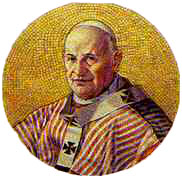 [/center]
[/center]
Mosaic image of Pope John XXIII – the Basilica of Saint Paul Outside the Walls – Rome
John died on June 3, 1963, six months before JFK's assassination. Vatican II finished up in Dec. 1965, and made a lot of waves which are still crashing on the heads of refuseniks like Mel Gibson and his father who never let go the Latin liturgy. It did away with other practices too, like fasting on Fridays and guardian angels, and adjusted Catholic relations with the world, abandoning scary stuff like black burqua-like habits for nuns and replacing it with more humane, less parochial approaches. His eighth and final encyclical, Pacem in Terris, "Peace on Earth," published April 11, 1963, is dedicated to "establishing universal peace in truth, justice, charity, and liberty," translation here: http://saints.sqpn.com/pope-john-xxiii-pacem-in-terris-peace-on-earth-11-april-1963/
Among other accomplishments John kicked off his papacy with a Christmas mass in an Italian prison:
On 25 December 1958, he became the first pope since 1870 to make pastoral visits in his Diocese of Rome, when he visited children infected with polio at the Bambino Gesù Hospital and then visited Santo Spirito Hospital. The following day he visited Rome's Regina Coeli prison, where he told the inmates: "You could not come to me, so I came to you." These acts created a sensation. . . . http://www.newworldencyclopedia.org/entry/John_XXIII
Here's a good vid (short too, only 52 seconds!) on the 4-1/2 year reign of John XXIII, still beloved by many but probably hated by more:
The Vatican only owns its property in Rome
and its nuncios, and Vatican City is about as big as an average urban university. Catholic properties (parishes, hospitals, etc) are typically owned by their local bishop, and since the pope is the bishop of Rome, he only "owns" his Roman property and the Vatican embassies. Here's a discussion of the question posted on DU eight years ago:
10. The General Rule is Catholic Property is owned by the Bishop/Diocese
This is based on the old Middle age Concept that the Property of a political/Religious unit is owned by the person in charge of that Political/Religious unit. In the Middle ages (Before modern concepts of land ownership appeared) the King was viewed as owning everything he had NOT sold to someone else (and this is still the theory on Land Titles in the US, you are the "Tenant" of the "King" who since July 4th, 1776 is now your state the land is in NOT the King of England). Wild Animals are owned by the "King" (Now the State) till taken as game EVEN IF ON PROPERTY OWNED BY A PRIVATE OWNER.
In the Middle ages this was Even more severe. If you were the Ruler of a an area you were also viewed as owning everything in that Kingdom or Dukedom or County etc. Bishops were viewed as having that same "power" except restricted to "Religious" property. Thus, unless there is clear evidence to the contrary, any property owned by the Catholic Church in a Diocese is "owned" by that Diocese's Bishop (and thus the Diocese).
You have exceptions, the house of the Papal Nuncio (The Ambassador from the Vatican) is "owned" by the Vatican not the Catholic Bishop of Washington. Other exemptions include Jesuits and Franciscan's (and other religious orders, including female religious orders) Monasteries, Convents, Schools, Retreats etc. are often owned by the Religious Society as opposed to the Diocese. You sometime have disputes when a Parish has its own funds, that the Diocese views as its own (Year to Year operating funds are rarely in dispute, but large endowments are often disputed especially when an old Church is closed i.e. what to do with that Parish's funds given the parish no longer exists).
My point here is a clear picture would take a lot of Research as to how various lands are held within a Diocese. If it is NOT clear otherwise the property belongs to the Diocese (and thus the Bishop).
Note the Pope is the "Bishop of Rome" NOT the "Bishop of the World" thus the only property the pope owns in in the Diocese of Rome EXCEPT where it is clear the papacy is the owner of the property instead of the local Bishop (Papal Nuncio and other Vatican missions are examples of this).
One note on the "Riches" of the Vatican, a lot of it are Art and Sculpture that any secular ruler of the 1500-1800s had to have to show he was a successful ruler. With expansion of Democracy such objects are no longer fashionable but the Vatican has more than most countries and have adopted a policy that other countries have adopted for such arts objects (i.e. put them in Museums so people can see them). The Vatican has several such Museums (Including one on "profane" art i.e. non-religious art objects) in Rome. These art objects are both valuable and in-valuable. I hate to say it the best solution to what to do with them is what the Vatican (and other European Governments with similar Art abjects obtains during the same time period) have done, put them in Museum instead of selling them to private collectors where most people will never see them.
http://www.democraticunderground.com/discuss/duboard.php?az=show_mesg&forum=104&topic_id=5691728&mesg_id=5691862
The long and short of it is that the Vatican owns about as much real estate as a typical state university. Ironically enough, when I was there last October, Italy announced plans to repeal its tax exemptions on all religions properties including the Vatican.
This is in line with Benny's general slant.
He's theologically conservative, true, and opposed Liberation Theology and clergy participating in politics, but his political views are consistently anti-war and anti-exploitation. We don't often hear about them because of the other problems he deals with, also because he writes in Latin and speaks in German-accented Italian, and is shy about using English.
But I like Benny more than the last pope, even though John Paul II was considered more charismatic. JP2 also tended to support NATO-friendly military objectives in Poland and elsewhere and was friendly with Thatcher and Reagan. Benny seems more simpatico with Putin, though I don't think they're actual buds, in that he's an old school collectivist who preaches against usury, as above, i.e. against the accumulation of wealth at the expense of ordinary people. Of course, that's been the official position of the RCC since there's been an RCC.
Anyway here's an article from September describing an anti-war sermon he delivered in Lebanon:
September 16, 2012 | By Patrick J. McDonnell, Los Angeles Times
Pope Benedict XVI's Lebanon visit is embraced by religious factions and Hezbollah militants. He praises the courage of Syrians in the audience as fighting continues in that country.
BEIRUT — Pope Benedict XVI on Saturday called on Christians and Muslims to forge a common front against warfare, even as battles raged in neighboring Syria and the new U.N. peace envoy to that country conceded that the situation there was deteriorating.
"It is time for Muslims and Christians to come together so as to put an end to violence and war," Benedict, 85, told an enthusiastic youth gathering on the second day of his three-day visit to Lebanon.
The pontiff spoke directly to young Syrians who were in attendance, singling them out for praise. "I want to say how much I admire your courage," Benedict told them. His comments came a day after the pontiff condemned transferring arms to Syria as a "grave sin."
(snip)
Still, the pope's presence in Lebanon was warmly embraced by all religious factions. Hezbollah, the Shiite Muslim militant group labeled a terrorist organization by the United States, lauded the papal visit as "extraordinary and historic."
The pope, calling himself a "pilgrim of peace," noted that the Middle East "seems to endure interminable birth pangs" but also "saw the birth of great religions and noble cultures."
(snip)
"In Lebanon, Christianity and Islam have lived side by side for centuries," the pope told a gathering of dignitaries and religious leaders. "It is not uncommon to see the two religions within the same family. If this is possible within the same family, why should it not be possible at the level of the whole of society?"
http://articles.latimes.com/2012/sep/16/world/la-fg-pope-lebanon-20120916
hey don't knock it til you've tried it
Benny and friends on a recent visit, Oct. 21, 2012:
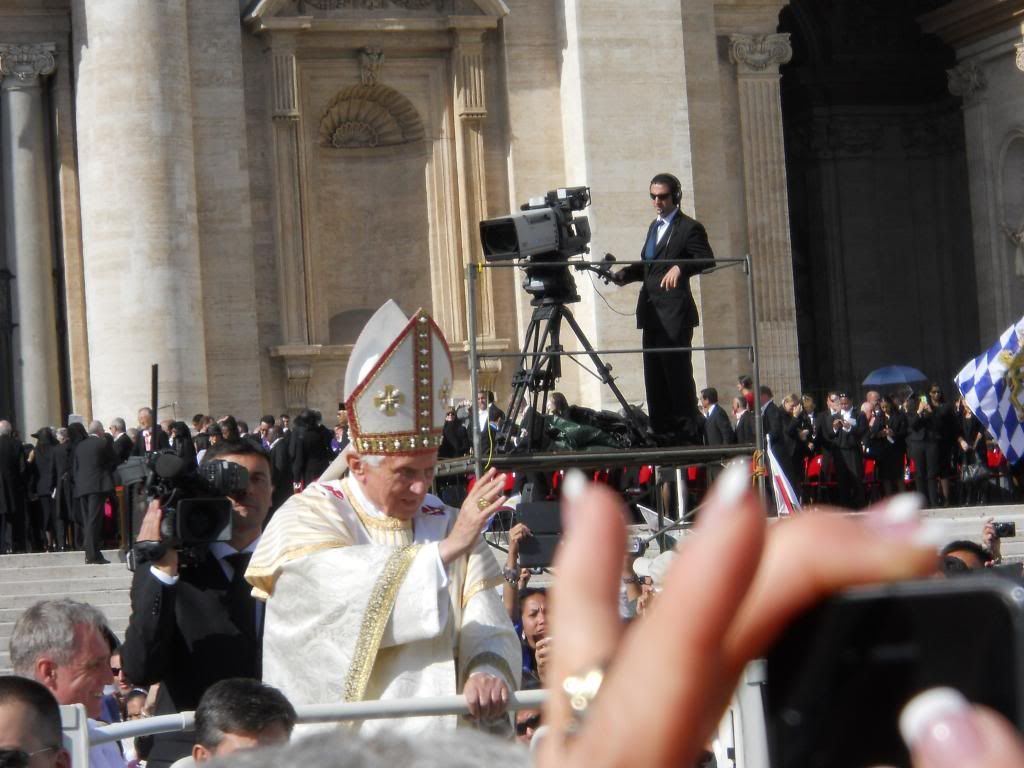
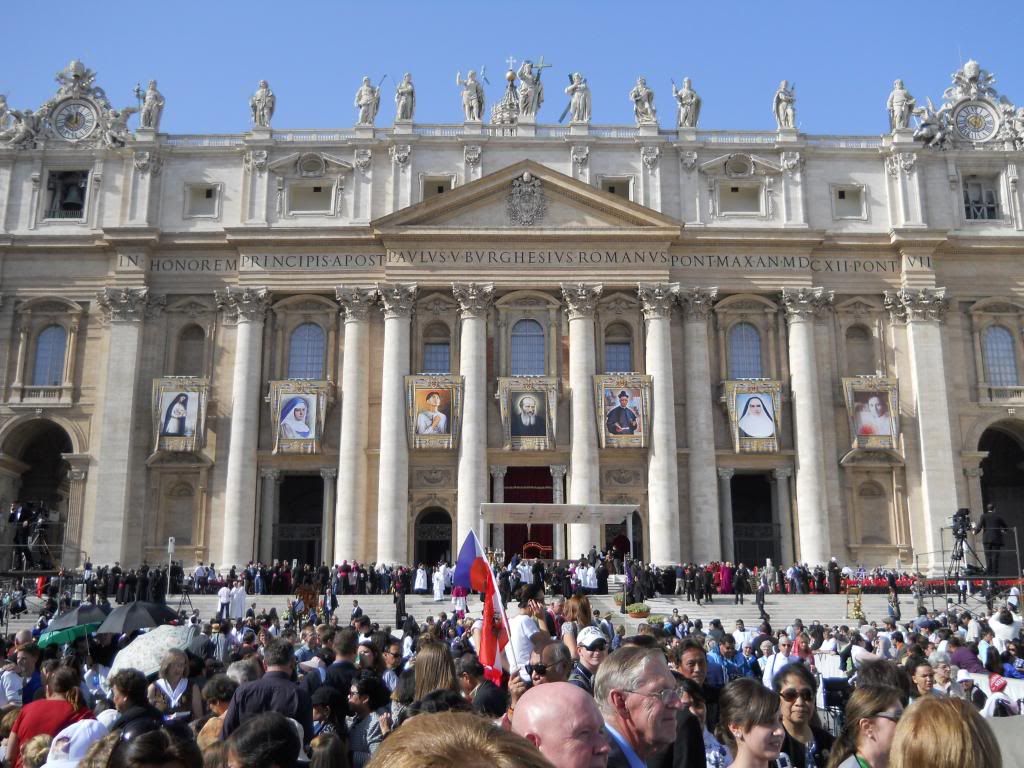
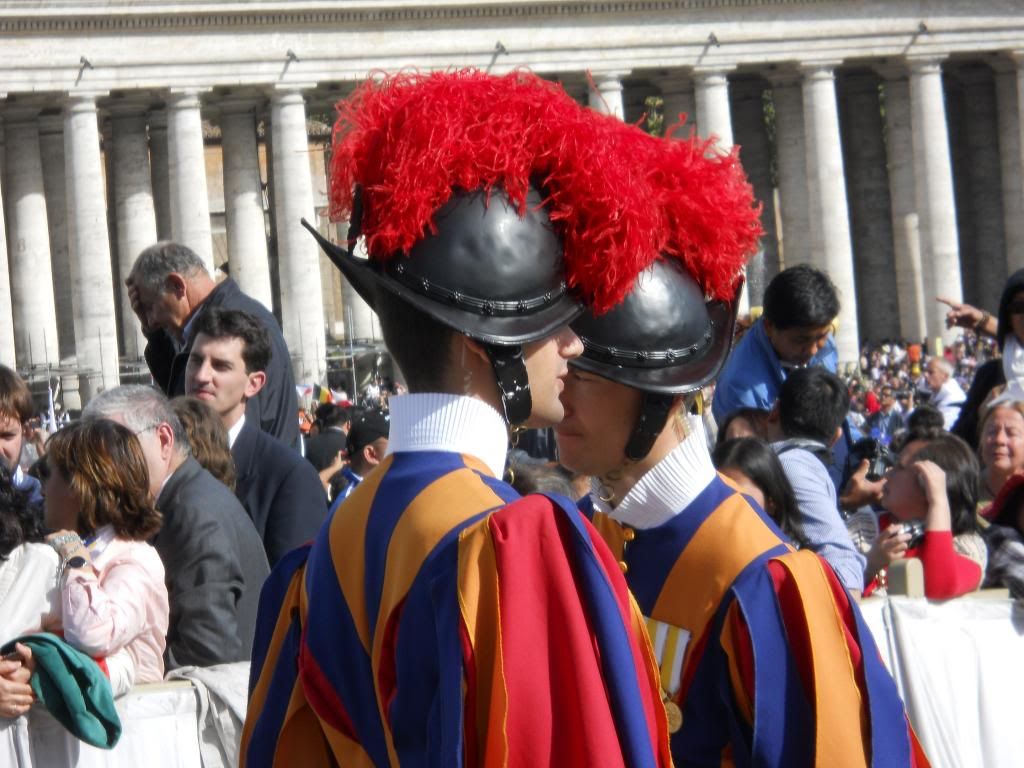
Can we alert on freakin' NPR?
I turn on the news and somebody's conducting an earnest interview with a good ol' boy named Brady (but not that Brady) drawlin' about how kewl M-16s are and why they're the country's best sellers and how he expects weapon sales to be brisk this holiday season and all that's missing is the 800 number and operators standing by:
http://www.npr.org/2012/12/17/167479065/one-gun-used-in-conn-attack-has-rambo-effect
So weapons have style? Call me cynical but how is this not a publicly-supported gun commercial? Especially since we know that gun sales spike after every mass murder, irrespective of any legislative grumbling, in fact because of the grumbling:
http://www.csmonitor.com/USA/DC-Decoder/2012/0725/Why-gun-sales-spike-after-mass-shootings-It-s-not-what-you-might-think
And now the money guy from Texas is running a business story on what else, the NRA. . .
While we're at an we get an alert button for this entire screwed up country?
Wow.
Thanks xchrom, I think we'll be seeing a lot more of this until it's firmly established that this shy young adult was a vengeful, violent, sexually confused misfit, and then the official story will sit well. But at the moment it looks to me like it doesn't quite add up and likely never will.
Great question. I think we can get a pretty clear idea
from JFK's 1960 campaign book, "The Strategy of Peace," which I recently got hold of. Here's what my used copy looks like:
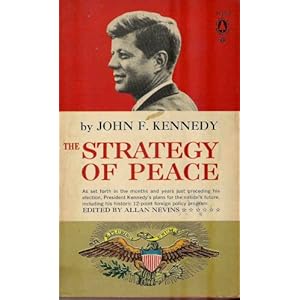
It's mainly devoted to foreign policy, his two main initiatives being world peace and nuclear disarmament, but he also has a section on domestic policy, "America's Readiness for World Responsibility," that goes through each area pretty thoroughly: Civil rights (he calls them civil liberties); scientific research and all levels of education including "A New Horizon for Negro Education"; farm, trade, and industrial policies, and a whole separate section on what he calls the "Economic Gap" (a play on "missile gap"![]() , namely unequal distribution of wealth in the US and in the world. It's pretty sharp. I've posted a few juicy quotes on this thread which I need to update:
, namely unequal distribution of wealth in the US and in the world. It's pretty sharp. I've posted a few juicy quotes on this thread which I need to update:
http://www.democraticunderground.com/10021965229
All in all it's a safer, more prosperous, and more generous world that Kennedy envisions, good for the people but less good for oil companies and war profiteers, and we know how that turned out. My guess is that if all 3 had lived there's also a good chance we'd be several years past fossil fuels and already utilizing cleaner, as-yet-to-be exploited technologies on a large scale.
JFK's 1960 "Strategy of Peace": just wow
(This is a continuation of Ocatfish's Nov. 22 "Justice for JFK thread," which appears to be archived, in response to Sabrina's comment #492, direct link: http://www.democraticunderground.com/?com=view_post&forum=1002&pid=1965210 )

Well it came in yesterday's mail, not the nice hardback in the pic above, but a battered Popular Library "Special” with faded red edges and a cover price of 50 cents, LOL. But if it's any indication of the 1960 campaign I can see exactly how JFK punked Tricky Dick, because every paragraph still exudes Kennedy can-do optimism and intelligence, also a rational and charitable view of foreign peoples and humanity in general. A couple of highlights:
1) The centerpiece is a region-by-region consideration of “areas of trial,” which sadly haven't changed much since 1960, apart from the particular hotspots: Israel, the Middle East, Indochina, Algeria (North Africa), Latin America, India and China, Poland and Eastern Europe.
2) Regarding Indochina: It turns out JFK had been urging the US to avoid military involvement in Vietnam since at least 1951, and he includes a 1954 speech reiterating in the clearest terms his earlier warning that “such intervention would be virtually impossible” to win and a "doomed failure" (p. 89).
3) Nuclear disarmament and sustainable world peace are his crystal-clear foreign policy themes, no conversion necessary. For example, point 11 of the “Twelve-Point Agenda” that opens the book: “We must begin to develop new, workable programs for peace and the control of arms,” followed by specific initiatives to accomplish these goals (pp. xiv-xv). Mutual understanding and cooperation are also themes that he returns to repeatedly.
4) Domestic policy: There's another section laying out his commitment to policies including “civil liberties,” scientific research, all levels of education including “a new horizon for [African American] education,” and “equal opportunity and economic justice for all [people] of all ages, races, and creeds” (this was 52 years ago so I updated a couple of terms).
5) Latin America: he says a lot of great stuff but I'll cut to the part about Bolivar and Castro:
Just as we must recall our own revolutionary past in order to understand the spirit and the significance of the anti-colonialist uprisings in Asia and Africa, we should now reread the life of Simon Bolivar, the great “Liberator” ... of South America, in order to comprehend the new contagion for liberty and reform now spreading south of our borders. On an earlier trip throughout Latin America, I became familiar with the hopes and burdens which characterize this tide of Latin nationalism.
Fidel Castro is part of the legacy of Bolívar, who led his men over the Andes Mountains, vowing “war to the death” against Spanish rule, saying, "Where a goat can pass, so can an army.” Castro is also part of the frustration of that earlier revolution which won its war against Spain but left largely untouched the indigenous feudal order. "To serve a revolution is to plow the sea," Bolívar said in despair as he lived to see the failure of his efforts at social reform.
Whether Castro would have taken a more rational course after his victory had the United States Government not backed the dictator Batista so long and so uncritically, and had it given the fiery young rebel a warmer welcome in his hour of triumph, especially on his trip to this country, we cannot be sure.
But Cuba is not an isolated case. We can still show our concern for liberty and our opposition to the status quo in our relations with the other Latin American dictators who now, or in the future, try to suppress their people's aspirations. And we can take the long delayed positive measures that are required to enable the revolutionary wave sweeping Latin America to move through relatively peaceful channels and to be harness to the great constructive tasks at hand. (pp. 167-69)
And so on. As I say nearly every page is “wow!” and “hell yes,” even the cold warrior bits, which contra Chomsky are rather tame and very clearly subordinated to his larger peace strategy. Anyway I'll keep browsing and post a few more highlights later.
Profile Information
Member since: Wed Oct 3, 2012, 09:48 PMNumber of posts: 408